- Home
- Iris Murdoch
The Green Knight Page 8
The Green Knight Read online
Page 8
‘Ah sex – a thunderstorm in the tropics when you are instantly soaked to the skin and in the lightning flash just for a second you see everything so bright and clear, including the tiger ready to spring!’
‘Are you still in that flat in the rue Vercingetorix?’
‘Yes, of course, why not?’
‘You said you were going to move.’
‘I can’t afford to. All right, I don’t want your money.’
‘It’s not on offer.’
‘You can be nasty.’
‘No, Joan, sorry, I’m not being nasty, I’m just so tired, and so terribly worried about Lucas.’
‘So everyone tells me. But, damn it, he can look after himself. I know him, I know Lucas, he’s a good deal better at self-preservation than we are. You make too much of it all. Could you fill up my glass, just fill it.’
‘You drink too much. All right, all right.’
‘Ça revient au même de s’enivrer solitairement ou de conduire les peuples. A great man said that.’
‘Great men can be bloody stupid.’
‘So can little men. So you haven’t forgotten our tiny flat?’
‘Not our flat, Joan, your flat.’
‘Well, you know what I mean.’
‘You mean too much. You annoy me.’
‘Oh how young and fresh you look, no wonder you prefer the younger generation! So, Aleph is up for grabs, and Rosemary, and – ’
‘Dear Joan, don’t talk nonsense, please, I just want to be with you in peace.’
‘Peace! When do I ever have peace? My life is scratched to bits.’
‘For God’s sake it was one night, and – ’
‘So you say. And you’ll say we were both drunk.’
‘Yes. It was only one – ’
‘How long is one? Sentimentally and in the soul it went on for ages, it still goes on, it goes on and on. I feel your arms around me, your kisses linger yet, You taught me how to love you, now teach me to forget! I’ll get the girls to sing that song, and I’ll cry, and so will you.’
‘I won’t cry.’
‘And I won’t forget. You lack loyalty, you lack generosity.’
‘That’s a serious charge, old friend.’
‘So I’m old friend now, am I? You remember nothing.’
‘There is virtually nothing to remember.’
‘ “Virtually” can cover a multitude of sins. Don’t you remember “si ça ne vous incommode pas je vais garder mes bas”? The sexiest thing Sartre ever said. Don’t worry, I won’t talk. All the same – Vercingetorix. It suits me to have a secret, it gives me power over you.’
Harvey was sitting on Tessa’s bed. Tessa was sitting beside him. Their sleeves touched. Harvey had stretched out his stone leg, not to exhibit its decorations, on which Tessa had already commented adversely, but in a vain search for a less painful position. Tessa had stretched out both legs, clad in sturdy shoes and high woollen socks pulled up over her trousers, making them look like knee-breeches. Her rather pale ‘angelic’ face, usually alert with attention and authority, often sardonic and amused, could become curiously blank, as if she were absent, her lips parted, her eyelids drooping. No doubt she was tired, resting, switching off her consciousness so as to regather strength. Harvey respected her withdrawal, he was proud that she could be thus withdrawn in his presence.
The rain had stopped. The thin house, in a battered terrace in Kilburn, was, somehow always, rather cold and damp. This was Tessa’s house, where she lived and slept and organised her ‘social work’. The hostel for the unhappy women was several streets away. (It was rumoured that Tessa had, elsewhere in London, a luxury flat to which she secretly retired when it was all ‘too much’.) The ground floor, which had been extended into the small untended garden, consisted of the office, a room for typing and interviews, and a very private primitive kitchen. The first floor was Tessa’s bedroom and bathroom and a room containing clothes, books, and other items belonging to Tessa, and a few cardboard boxes full of give-away clothing. The top floor, now also colonised by Tessa, had housed a lodger, a Mr Baxter, who had made a tiny contribution toward the rent, but had disappeared suddenly, said to be in prison or perhaps dead. The house was cold, small electric fires, sparingly switched on, being the sole source of heat. Mr Baxter had had an electric fire on a meter, but that had vanished shortly prior to his own disappearance. Tessa had once explained to Harvey that the secret of keeping warm in winter was not to vary the temperature, to let the weather into the house and rely on warm clothing. She should know, having survived a cold winter in the protest camp, living in a makeshift tent which scarcely covered her body, and spending the day searching for firewood. (At least they lit fires there, thought Harvey.) It was like, she said, the rule well known to biologists that the way not to feel hungry was to refrain from eating. A little food brings on an urge for more. People who fast become used to it in a few days. By this method one could at least learn to do without breakfast and lunch. Harvey, who required food as pleasure and had not yet discovered it as a necessity, did not care for these lines of thought.
The doorbell rang downstairs. Tessa locked the door at six and could ruthlessly refuse to answer. She proclaimed that the evening was hers and that she was often out: perhaps, rumour had it, in chic clothes at grand houses. She moved a little away from him and they looked at each other. The bell rang again. Then silence. She murmured, ‘If it was urgent they’d go on ringing. The telephone is switched off too.’
‘It might be a friend.’
‘No. Friends have codes.’
‘Don’t tease me. Everything wounds me now except perfect kindness.’
‘I can’t provide that at this time of day.’
‘Sorry. I shouldn’t have hinted that I wanted to see you. It’s very kind of you to – ’
‘Yes, yes. Do you want to talk about your mother?’
‘You make people talk about other people.’
‘Only if they want to. What people say about other people says a lot about the people themselves.’
‘I’m afraid she’ll take to drugs, she talks about getting “hooked”. She pretends to be desperate and suicidal. Or is it pretence?’
‘Yes, it’s pretence. Next question.’
‘Please – ’
‘She has tremendous energy and a tremendous will to live. I don’t think she is suicidal. Desperation is her mode of willing to live.’
‘Oh well – you visited my grandmother.’
‘Are you jealous?’
‘Yes. That’s another wound. Tessa, don’t be cold and brisk with me. I don’t want to talk about my mother, I want to talk about myself. I feel so depressed. I have to be merry and bright while I just want to cry.’
‘Cry then, cry here, everyone else does.’
‘You must be tired of weeping persons.’
‘Do those girls still cry? You said they cried a lot.’
‘Yes. Don’t be nasty about them.’
‘I’m not nasty, I’m just interested. I respect Sefton. But they are all sick with values, crammed with good behaviour. In a way I envy them. Perhaps they’ll get away with it. Is the dog still there?’
‘Now you’re talking about the dog. Yes.’
‘Bellamy ought not to have given the dog away. A dog is forever. The dog will run off and vanish. Then there’ll be tears.’
‘I’m afraid so.’
‘Bellamy is totally mistaken about himself. He is a fool.’
‘Perhaps a holy fool.’
‘Ridiculous phrase. Holiness requires intellect. The Jesuits understand that.’
‘Don’t be cross with me.’
‘Harvey, I’m not cross. I’m just very tired. I’m sorry I asked you to come, I have nothing for you.’
‘Just being with you helps me, I feel you are in the truth.’
‘Where do you pick up these bizarre phrases?’
‘You regard my mother as a patient, as a case.’
‘You like to see it
that way. You want to feel that someone is looking after her. I love her, I calm her, she is so picturesque, she is a witch, a leprechaun, daft as a brush. What a tonic.’
‘I have never understood why a brush is daft.’
‘It is something to do with foxes.’
‘Oh Tessa, I’m so miserable, I feel so unreal, so sick, as if my whole inside had been removed, I feel vacant, I’m a puppet, I feel I’ve died, I wish you’d take me on as a case.’
‘It wouldn’t do, dear child.’
‘Why not? You can’t imagine how unhappy I am.’
‘I can. But your kind of unhappiness must cure itself. You have a healing substance in your own body and soul, it is called courage. Your mother has it too. Call upon it, let it flow. Besides you are young and have work and a place in life. Read, study, think.’
‘I can’t. I’m an orphan. I realise it for the first time. My mother is just like a child. I can’t go near Louise, she’s taboo, and anyway she doesn’t want me – ’
‘Well, please don’t elect me to be mother. Harvey, stop. Tell me something. Is there any news of Lucas?’
‘Not that I know of.’
‘You all need him.’
‘Why do you say that?’
‘He’ll put you in order. He’ll make you jump. He is the ringmaster.’
‘I didn’t know you liked him.’
‘I don’t. But he’s really real.’
‘Let’s go out and have a drink.’
‘No, I’ve got to be somewhere else. With a beard St Joseph, without the Virgin Mary, as they say in Spain.’
Harvey had left the ‘refuge’ and was sitting on the sofa in the drawing-room in Emil’s flat. The numerous lamps were softly shaded, the distant traffic hummed in the Brompton Road. Emil collected pictures. He possessed, for instance, a Bonnard and a Vuillard and a Max Ernst and a Caillebotte and a Nolde and a drawing by Picasso and an Otto Dix and some early Hockneys. In honour of such treasures Harvey faithfully remembered to turn the burglar alarm on and off and carry about him a jangling bunch of keys. The peach-pink walls were covered with pictures, not all of which Harvey, though often in the room, had asked Emil to identify. It was very kind of Emil to lend him his flat. He could intuit that Clive was less enthusiastic. In the afternoon he had tried to work. As he told everybody, there was plenty of work he could get on with, studying Dante for instance. But his ‘study’ seemed to consist of reading some of his favourite passages – and finding that their magic had faded. When he returned from Tessa he fried some eggs in Emil’s dream kitchen, clearing up carefully afterwards. Louise had shopped for him, stocking the flat with goodies, but supplies were running out. Soon he would have to shop for himself: a first sign in a gradual process of being forgotten . Louise had said vaguely, ‘Come over any time, come to supper’; but, and this was another sign, although he longed to see Louise, and to see Aleph, he increasingly lacked the will to go. He was afraid, he was ashamed, he was a cripple, he was disabled. He could not bear their all feeling sorry for him, their sympathy might reduce him to tears. The Harvey who had been once so handsome, so long-legged and athletic, did not exist any more. He couldn’t even wash properly. He had lost, and lost forever, his youthful pride, his freedom, his nerve. All he could do now was attempt, but surely in vain, to conceal the extent of his loss. He watched television pictures of a war, of a football match, of worthy people in wheel-chairs. He thought about his father and wondered if his father ever thought about him. His leg was hurting alarmingly. They had spoken of taking the cast off again. What would they find underneath? Something decayed and rotting, suitable only for amputation.
“And the many many times that I took her in my arms, just to save her from the foggy foggy dew!” ’
‘I like the descant,’ said Clement to Louise. The girls were singing in the Aviary below.
‘That’s Aleph.’
‘With that soprano she should have a singing teacher.’
‘She had a piano teacher at school.’
Clement was about to protest against the weary irrelevant reply, why had he not, long ago, paid for Aleph’s singing lessons? Everything in his life now seemed to signal: too late. The little flat in Fulham where he had lived for years remained provisional, a pied à terre. Of course he was often away, involved in some play in the provinces or else with theatre people he knew in Paris. He even thought at one time of moving to Paris. He did not exactly dislike his flat, but he lacked faith in it. He did not buy pretty things for it. He ‘starved it’, as Louise said. The only interesting object in it was an early picture by Moy of a girl among some flowers. Clement was still waiting for the storm wind or tsunami which would carry him to some much higher level.
He had made a habit (of course not unannounced) of, once or twice a week, walking over to see Louise in the evenings. He liked London walking. These evening meetings had become easier since Louise and the girls now took their meals at different times, Louise having ‘high tea’ about seven, and the girls having supper, cooked usually by Moy, sometimes by Sefton, at eight-thirty. Louise sometimes made special dishes for them which could be heated up. This arrangement, like many such customs in the house, had somehow come about automatically, as a confluence of desires or ‘general will’. The girls, who had quietly ‘acquired’ the Aviary, had now taken over the kitchen. So Louise now retired earlier, disappearing to her bedroom before the girls, finishing their evening meal, returned to the Aviary. This regime made for her a slow elegiac ending to the day. She read, she sewed, she listened to music, she thought. She had never, in her married life, had so much regular solitude. Into this hall of meditation, however, as into a space prepared, Clement was now entering. Perhaps Louise, enjoying her new peace and quiet, was also aware of a new loneliness. Perhaps Clement sensed this, perhaps he was sorry for her. Their relations, though of such long and firm standing, were obscure, simple and limited, even awkward. Yet, with all this, they talked easily enough. Louise, who did not often ‘go out’ or ‘dress up’, wore usually in all seasons a uniform of cardigan, blouse and skirt. This evening she was wearing a richly nut-brown winter dress with a blue and green silk scarf. Clement thought, I gave her that scarf long ago. Then he thought, no, of course Teddy gave it to her. Her ‘stiff’ hair swept back off her pale unmarked brow, tidied in this way by nature. She avoided hairdressers, Aleph cut her hair. Her light-golden-brownish wide-apart eyes gazed benignly at her visitor, and her mouth pouted a little with friendly restful pleasure. She was sewing, mending the lining of an old corduroy jacket of Sefton’s. He thought, how calm she is, I mean how calm she seems.
‘So you won’t come to the ballet? You ought to come out more.’
‘Oh, I will, I will.’
‘I can hear Anax walking about on the floor above, his claws are clicking on the boards.’
‘Moy will fetch him down soon.’
‘There’s something organic about this house. Sefton cooking, Aleph playing the piano, you sewing, Anax walking, and Moy – well, being Moy, communing with a thing perhaps.’
‘She thinks everything in the world is alive.’
‘She gives it life.’
‘Wouldn’t you like something to eat?’
‘No, I had some sandwiches when I left the theatre.’
‘You’re still working in that little place, someone was ill?’
‘Yes. I don’t like working on someone else’s stuff, but it’s urgent. I’ll finish soon. Damn, I meant to ring Harvey, I missed him at – well – ’
‘Where?’
‘Oh, at his flat. I thought he might be there, but he had just left, Joan seemed to be all right, Tessa was with her.’
‘Oh. I’ve told Harvey he can come to lunch or supper here anytime but he doesn’t come.’
‘He thinks you’re pitying him. It’s not like it used to be. You must name a date.’
‘He said he was working.’
‘I bet he wasn’t. I can’t work properly. Oh God, I wish Lucas would turn up,
I can’t stand this waiting. I begin to feel that I ought to go out and look for him, I just want to do something, not just wait.’
‘I know. But you’ve already used up every possible – ’
‘Yes, but I ought to go to all these places, I ought to go to America – or else – just set off into the blue, just search with – with faith – ’
‘Wandering penniless and at random?’
‘How can I stay here and get on with normal comfortable life?’
‘You want to suffer for him.’
‘I feel he may be in some terrible state of mind. He was rather low even before that business.’
‘You mean because he didn’t get the Chair at Cambridge?’
‘He’s terribly sensitive and vulnerable.’
‘He’s lucky to have a brother who cares for him so much. Brothers don’t always love each other. But you’ve always been close.’
‘I feel I’m at the end of something – everything is going to be different – and terrible.’
‘That doesn’t sound like you, you ride every wave.’
‘There is one that will drown me. You know, the theatre is a tragic place, full of endings and partings and heartbreak. You dedicate yourself passionately to something, to a project, to people, to a family, you think of nothing else for weeks and months, then suddenly it’s over, it’s perpetual destruction, perpetual divorce, perpetual adieu. It’s like éternel retour, it’s a koan. It’s like falling in love and being smashed over and over again.’
‘You do, then, fall in love.’
‘Only with fictions, I love players, but actors are so ephemeral. And then there’s waiting for the perfect part, and being offered it the day after you’ve committed yourself to something utterly rotten. The remorse, and the envy and the jealousy. An old actor told me if I wanted to stay in the trade I had better kill off envy and jealousy at the start. You know, sometimes, I feel I’d like to be back in the circus.’
‘You said the life was hell.’
‘I like circus people. They’re quite unlike theatre people. They’re crazy, they’re gypsies, they don’t make mean calculations. It’s as if they expected death all the time, even if they weren’t on the high wire.’

 Jackson's Dilemma
Jackson's Dilemma The Flight From the Enchanter
The Flight From the Enchanter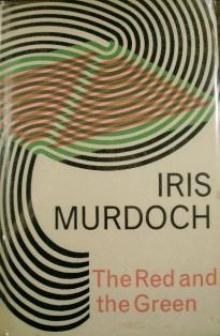 The Red and the Green (Vintage Classics)
The Red and the Green (Vintage Classics) A Severed Head
A Severed Head The Black Prince
The Black Prince The Nice and the Good
The Nice and the Good The Unicorn
The Unicorn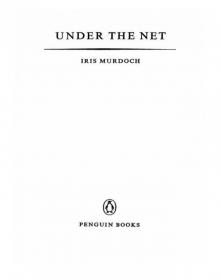 Under the Net
Under the Net The Italian Girl
The Italian Girl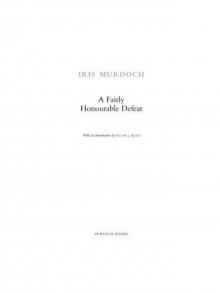 A Fairly Honourable Defeat
A Fairly Honourable Defeat An Accidental Man
An Accidental Man A Word Child
A Word Child The Philosopher's Pupil
The Philosopher's Pupil The Book and the Brotherhood
The Book and the Brotherhood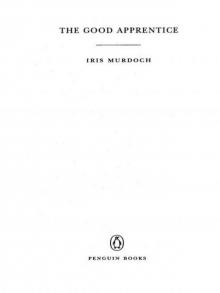 The Good Apprentice
The Good Apprentice The Sacred and Profane Love Machine
The Sacred and Profane Love Machine The Bell
The Bell Henry and Cato
Henry and Cato Metaphysics as a Guide to Morals
Metaphysics as a Guide to Morals The Time of the Angels
The Time of the Angels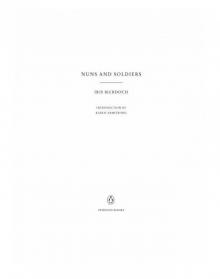 Nuns and Soldiers
Nuns and Soldiers The Green Knight
The Green Knight The Sea, the Sea
The Sea, the Sea Sartre: Romantic Rationalist
Sartre: Romantic Rationalist Bruno's Dream
Bruno's Dream An Unofficial rose
An Unofficial rose Sartre
Sartre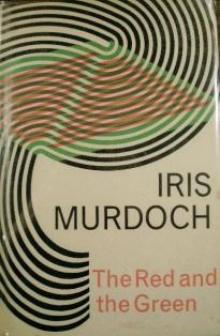 The Red and The Green
The Red and The Green